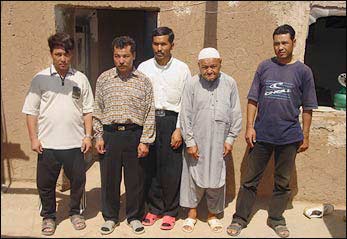Mobile teams bring repatriation news to rural Afghan refugees
Mobile teams bring repatriation news to rural Afghan refugees

SHAHID NASERI SAVEH, Iran (UNHCR) - For more than a decade, home-going had been out of the question for Afghan refugees at Iran's Shahid Naseri Saveh camp. "There's still a war going on in Afghanistan," they said, referring to years of conflict in their homeland.
Until recently, 75-year-old Nabi and his family had been under the same impression. Life at the camp became a reality for them after they fled their hometown in Afghanistan's Bamiyan province for Iran in 1988. Nabi's son Mohammed met his wife at the camp, and they now have a seven-month-old baby. Nabi's other son Bahman also got married while in exile.
Like Nabi, many of the 3,800 refugees have lived at the camp for more than 10 years, losing touch with news from Afghanistan. Some have no idea the Soviet invasion had ended long ago, that the Taleban regime had fallen, and that a new government is now in place in Kabul.
But after a recent visit by UNHCR's mobile unit, Nabi and his family have become the first to return home from Shahid Naseri Saveh camp, 120 km south of Tehran. They decided to go back to Afghanistan after learning about conditions in their home area and about the UN refugee agency's repatriation programme.
"It is safer now in Afghanistan," said Nabi. "There is no war anymore. We don't have a house there anymore, and no land. But we will make it work."
On Tuesday, Nabi and his family left the camp with UNHCR transport to Herat in Afghanistan. Once they arrive, they will receive help for their onward journey to Bamiyan province. The old man was a farmer there before his exile, and he hopes that his sons will be able to take up farming upon their return.

Explaining the refugee agency's information campaign, UNHCR's Representative in Iran, Philippe Lavanchy, said, "One of our objectives this year is to ensure that refugees have access to information regarding the repatriation programme and the situation in Afghanistan. We want to make sure that this information is communicated to all refugees, everywhere in Iran."
UNHCR's mobile teams are an ideal way to convey this information, especially to refugees in less accessible areas of Iran. The teams are made up of one or two UNHCR staff, usually based in one of Iran's 11 voluntary repatriation centres. Several times a month, they visit some of the rural or more remote areas of the country to perform all the functions of a voluntary repatriation centre. They inform the refugees about home conditions, interview and register those who want to repatriate, and organise transportation to Afghanistan for returnees.
Nabi's departure has generated much interest in Shahid Naseri Saveh camp, even though his family is not typical of the camp's population. Nabi is an ethnic Hazara in a camp where 98 percent of refugees are ethnic Pashtuns, for whom return may not be an immediate option.
After the fall of the Taleban regime, some ethnic Pashtuns were targeted in Afghanistan, especially in the north and south of the country. Some refugees at Shahid Naseri Saveh camp remain fearful of return.
Azizollah has been in Iran for 25 years. A merchant from Herat, he fled Afghanistan to escape the Soviet invasion of the country. "Things are still bad for Pashtuns in Herat," he said. "But I want to go back, when things are safer for me and my family. Of course I want to go back, it is my country."
Refugees around him nodded in agreement. They too want to go back to Afghanistan, if the situation is good for them and their families. In the meantime, UNHCR will continue to provide them with the information they need to be able to take the momentous decision to go back home after years in exile.








